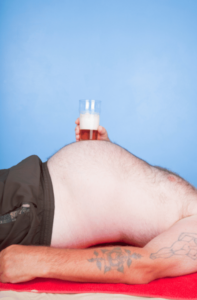For a lot of guys, the so-called “beer gut” or “beer belly” is a familiar and often joked-about part of getting older. It’s easy to dismiss that growing belly as just a natural part of life or something to laugh off, but behind the humor lies a more serious issue – one that can have significant implications for your health and well-being. The beer gut is not just an aesthetic concern; it’s a sign of deeper health problems that can affect everything from your metabolism to your hormones.
Contrary to popular belief, a beer gut isn’t just caused by beer. It’s the result of a combination of factors, including diet, lifestyle, and aging, that lead to the accumulation of visceral fat – fat that wraps around your internal organs and poses serious health risks. As men age, hormonal changes, particularly a decline in testosterone, can make it easier to gain weight in the midsection and harder to lose it.
In this blog, we’ll crack open the beer gut phenomenon, exploring its causes, the hidden dangers it poses, and the steps you can take to combat it. Understanding the true impact of that extra belly fat is a vital step toward protecting your health and well-being.
So What Is a Beer Gut?
The term “beer gut” has become a common part of our cultural lexicon, often used humorously to describe the extra weight that a lot of guys carry around their midsection. But what exactly is a beer gut, and why does it develop?
A beer gut refers to the accumulation of excess fat in the abdominal area, resulting in a protruding belly that is particularly noticeable in middle-aged and older men. While it’s commonly associated with beer consumption, the reality is a bit more complex. The beer gut is a type of visceral fat – fat that accumulates deep within the abdomen, surrounding vital organs like the liver, pancreas, and intestines. Unlike subcutaneous fat, which lies just under the skin, visceral fat is metabolically active and can significantly impact your health.
The name “beer gut” stems from the common belief that drinking beer is the primary cause of this type of fat accumulation. While it’s definitely true that alcohol, including beer, can and often does contribute to weight gain due to its high-calorie content and inflammatory properties, it’s not the sole culprit. The development of a beer gut is influenced by a combination of factors, including overall diet, lack of physical activity, and hormonal changes that occur with age.
Certain demographics are more prone to developing a beer gut. Middle-aged men are particularly at risk due to a natural decline in testosterone levels, which makes it easier to store fat around the abdomen and harder to build and maintain muscle mass. Additionally, men who lead sedentary lifestyles, consume high-calorie diets, or regularly indulge in alcohol are much more likely to see the effects of these habits manifest in the form of a beer gut.
What Causes A Beer Belly
Listen, guys, this beer gut thing doesn’t happen overnight. It’s the result of a combination of lifestyle choices, dietary habits, and natural changes that occur as we age. You’ve got to understand these causes to effectively address and prevent the accumulation of all that excess fat.
Excessive Caloric Intake
One of the primary drivers of the beer gut is consuming more calories than your body needs, leading to weight gain and fat accumulation. While beer is often blamed due to its high calorie content – about 150 calories per 12-ounce serving – it’s not just beer that contributes to this issue. High-calorie foods, particularly those rich in sugars and unhealthy fats, also play a significant role. Fast food, processed snacks, and sugary drinks are all culprits that add to the daily caloric overload, contributing to fat storage, especially in the abdominal area.
Sedentary Lifestyle
A lack of physical activity is another major factor contributing to the development of a beer gut. Many men lead increasingly sedentary lives, often spending long hours sitting at a desk, commuting, or relaxing on the couch. This inactivity leads to a slower metabolism and reduced calorie burn, making it easier for the body to store fat. Without regular exercise, especially activities that burn calories and build muscle,  fat tends to accumulate around the midsection.
fat tends to accumulate around the midsection.
Hormonal Changes
As you get older, hormonal changes, particularly a decrease in testosterone levels, can make you more susceptible to gaining abdominal fat. Testosterone plays a key role in regulating fat distribution and muscle mass. When testosterone levels drop, as they naturally do with age, a lot of guys will notice an increase in body fat, particularly around the abdomen, and a decrease in muscle mass. This shift in body composition can make it more challenging to maintain a healthy weight and avoid the beer gut.
Alcohol Consumption
Alcohol, including beer, definitely does contribute to weight gain, but not solely because of its calorie content. Alcohol consumption can disrupt the body’s metabolism, slowing down the process by which calories are burned. When you drink alcohol, your body prioritizes metabolizing the alcohol over other nutrients, which can lead to an increase in fat storage. Additionally, alcohol can lower inhibitions, making it more likely that you’ll overeat or make unhealthy food choices, further contributing to calorie surplus and fat accumulation.
Feminizing and Hormonal Effects of Beer
While the accumulation of abdominal fat is concerning in itself, there’s another layer to the beer gut phenomenon that many men might not be aware of: the feminizing effects that beer can have on the male body. This is largely due to the presence of phytoestrogens and the impact of alcohol on hormonal balance.
Phytoestrogens
Beer, particularly those made from hops, contains phytoestrogens – plant-derived compounds that mimic estrogen in the body. Hops are one of the richest sources of phytoestrogens, and while these compounds are not inherently harmful in small amounts, regular and excessive consumption of beer can lead to an increase in estrogenic activity in the male body. This can result in a hormonal imbalance, where estrogen levels rise relative to testosterone levels, contributing to the development of characteristics that are typically more associated with female biology, such as increased fat deposition in the breast area, known as gynecomastia.
Impact on Testosterone Levels
Testosterone is the primary male hormone responsible for muscle growth, fat distribution, and maintaining a lean physique. However, excessive alcohol consumption, particularly from beer, can disrupt the balance of testosterone in guys. Alcohol interferes with the production of testosterone and can lead to lower levels of this crucial hormone. Lower testosterone levels not only make it easier for fat to accumulate, especially in the abdominal region, but they also contribute to a decrease in muscle mass, further exacerbating the beer gut phenomenon.
Long-Term Health Risks
The hormonal imbalances caused by excessive beer consumption can lead to more than just physique changes. Over time, these shifts in hormone levels can increase the risk of more serious health issues, including metabolic syndrome, insulin resistance, and cardiovascular diseases. Men with lower testosterone levels may also experience fatigue, decreased libido, and other symptoms that can significantly affect their quality of life.
Not many people know about these hormonal effects from beer, which is pretty ironic considering how many guys form their “manly” identity around drinking beer. It sucks to hear, but this is certainly something worth being aware of fellas.
Strategies to Combat the Beer Gut
Guys, minimizing that beer gut is not just about how you look; it’s about reclaiming your health. Here are some straightforward strategies to help you reduce abdominal fat and improve your overall well-being:
Dietary Adjustments
- Reduce Caloric Intake: Focus on whole, nutrient-dense foods like lean proteins, vegetables, and complex carbs. Cut back on processed foods and sugary drinks, which contribute to excess calorie intake and fat storage.
- Limit Alcohol Consumption: Moderation is key. Reduce the frequency and quantity of alcohol consumption, and opt for lower-calorie options when you do drink.
Increasing Physical Activity
- Incorporate Regular Exercise: You have to move lads! Engage in a mix of cardio exercises, like running or cycling, and strength training a few times a week to boost your metabolism and burn fat.
 High-intensity interval training (HIIT) can be particularly effective for reducing abdominal fat.
High-intensity interval training (HIIT) can be particularly effective for reducing abdominal fat. - Stay Active Daily: Simple changes like walking more, taking the stairs, and standing instead of sitting can make a big difference over time.
Support Hormonal Health
- Focus on a balanced diet, regular exercise, and sufficient sleep to maintain healthy testosterone levels.
- Managing stress is also crucial, as chronic stress can negatively impact hormone balance.
By making these simple yet effective lifestyle changes, you can significantly reduce the risk of developing a beer gut and improve your overall health. It’s not about big drastic measures, but about consistent, manageable steps that lead to lasting results.
Closing Thoughts
The beer gut is more than just an unwelcome change in your appearance; it’s a sign of some serious underlying health issues that can have severe consequences if left unchecked. From the accumulation of visceral fat to the hormonal imbalances caused by excessive alcohol consumption, the impacts of a beer gut extend far beyond the surface. However, by understanding the causes and taking some proactive steps to address them, you can maintain or even regain control of your health and reduce your risk of long-term complications.

Remember, it’s not about perfection or extreme measures. Small, consistent changes in your diet, exercise routine, and lifestyle will make a significant difference over time. By doing what you can to prioritize your health now, you’re not just improving your appearance – you’re also investing in a healthier, fully alive future.


 High-intensity interval training (HIIT) can be particularly effective for reducing abdominal fat.
High-intensity interval training (HIIT) can be particularly effective for reducing abdominal fat.





